Vitamins are a group of nutrients that are essential for normal cell function, growth, and development and are grouped into two categories.
1. Fat-soluble vitamins are stored in the body’s fatty tissue and are are Vitamins A, D, E, and K.
2. There are nine water-soluble vitamins which are Vitamins C, B1, B2, B3, B5, B6, B7, B9, and B12. The body must use water-soluble vitamins right away. Any left over water-soluble vitamins leave the body through the urine. Vitamin B12 is the only water-soluble vitamin that can be stored in the liver for many years. (source)
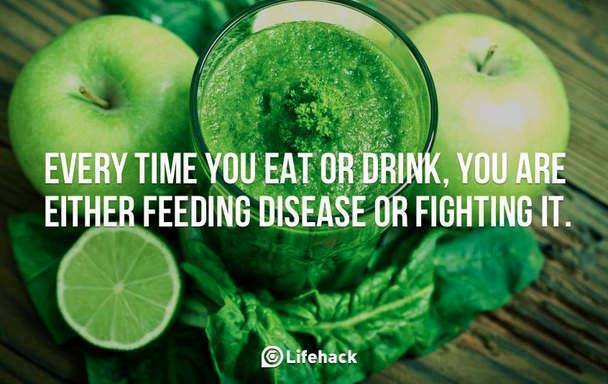
All nutrients like vitamins are available from the earth and sun. Fat-soluble vitamins and Vitamin B12 are stored in tissue of human animals and non-human animals. While you could choose to eat someone who ate a decent diet to get their vitamin and other nutrient stores, it is much more compassionate and Earth-friendly to eat a decent diet yourself and get the nutrients from where the non-human animals got them: the earth and the sun.
Click: Nutrition Only in Animal-Based Foods
Below are 13 essential vitamins and their plant, sun (Vitamin D), or supplement/fortification sources (Vitamin B12).
1. Vitamin A – helps form and maintain healthy teeth, bones, soft tissue, mucus membranes, and skin. Found in dark colored fruit and dark leafy vegetables.
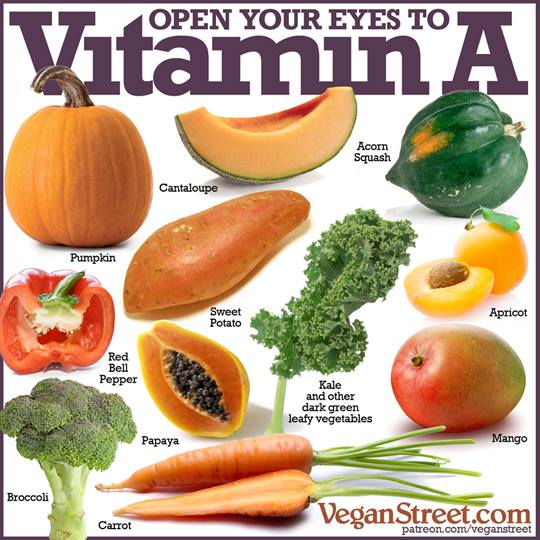
2. Vitamin B1 (Thiamine) – supports healthy functioning of the heart, muscles, and nerves. Plays a role in the breakdown of carbohydrates and conversion into energy. Helps maintain normal enzyme function. Found in brewer’s yeast, wheat germ, peas, peanuts, whole grains, nuts, rice bran, oatmeal, flax seeds, sunflower seeds, asparagus, kale, cauliflower, potatoes, oranges, legumes, watermelon, and brown rice.
3. Vitamin B2 (Riboflavin) – plays a role in the breakdown and use of carbohydrates, fats, and proteins. Involved in cell energy production. Supports the production of adrenal hormones. Helps the body utilize other B vitamins. Support the eyes and is important for body growth and production of red blood cells. Formally known as Vitamin G. Found in brewer’s yeast, broccoli, Brussels sprouts, asparagus, green leafy vegetables, wheat germ, legumes, mushrooms, and almonds.
4. Vitamin B3 (Niacin, Nicotinic Acid) – involved in the breakdown of carbohydrates and fats, healthy functioning of the nervous and digestive systems, and the production of sex hormones. Helps maintain health skin and has a cholesterol lowering effect. Also known as Vitamin P or Vitamin PP. Found in brewer’s yeast, peanuts, legumes, mushrooms, avocados, nuts, potatoes, and whole grains.
5. Vitamin B5 (Pantothenic Acid) – involved in the breakdown of food and use of carbohydrates, proteins, and fats. Supports normal growth and development. Involved in production of cholesterol, adrenal and sex hormones. Helps the body use other vitamins. Supports sinuses. Found in bran, whole grains, cauliflower, sweet potatoes, beans, nuts, avocado, legumes, broccoli, kale, lentils, mushrooms, white potatoes, and brewer’s yeast.
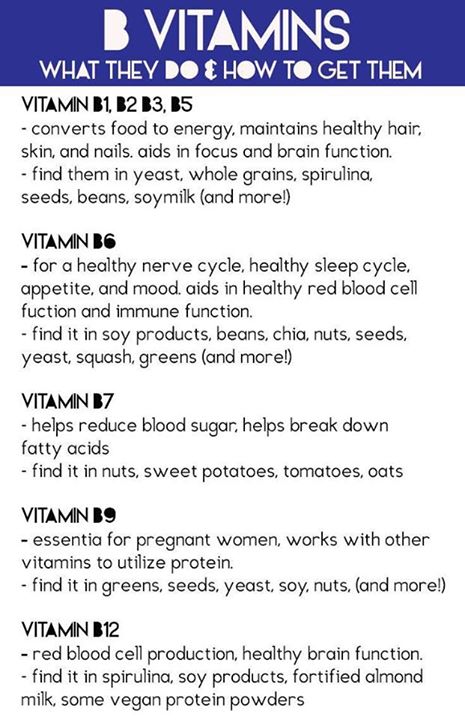
6. Vitamin B6 (Pyridoxine, Pyridoxal, or Pyridoxamine) – involved in the breakdown of proteins, carbohydrates, and fats. Involved in healthy functioning of the nervous/brain and digestive systems. Involved in the production of red blood cells and antibodies. Helps maintain healthy skin. Found in soybeans, bananas, legumes, potatoes, oatmeal, whole grains, vegetables, nuts, avocado, brewer’s yeast, wheat bran, blackstrap molasses, and wheat germ.
7. Vitamin B7 (Biotin) – plays a key role in the metabolism of fats, proteins, and carbohydrates. Necessary for cell growth and the production of fatty acids, hormones, and cholesterol. Also known as Vitamin H or Coenzyme R. Found in peanuts, Swiss chard, leafy green vegetables, whole grains, legumes, nuts, yeast, and Saskatoon berries.
8. Vitamin B9 (Folic Acid, Folate) – required for normal cell division especially during pregnancy and infancy. Aids in the production of red blood cells with Vitamin B12. Required to synthesize DNA and repair DNA which control tissue growth and cell function. Also known as Vitamin M. Found in dark green leafy vegetables, lentils, oranges, peanuts, wheat germ, fruits, nuts, beans, peas, whole grains, avocado, spinach, yeast, asparagus, broccoli, beets, and Brussels sprouts.
9. Vitamin B12 (Cobalamin, Cyanocobalamin) – involved in growth and development and in production of red blood cells. Plays a key role in the normal functioning of the brain and nervous system and for the formation of blood. Helps the body use folic acid. Found in dirt bacteria or B12 supplements or fortified foods.
10. Vitamin C (Ascorbic Acid) – an antioxidant that promotes healthy teeth and gums. It helps the body absorb iron and maintain healthy tissue. It also promotes wound healing. Found in broccoli, Brussels sprouts, cabbage, cauliflower, citrus fruits, potatoes, spinach, strawberries, and tomatoes.
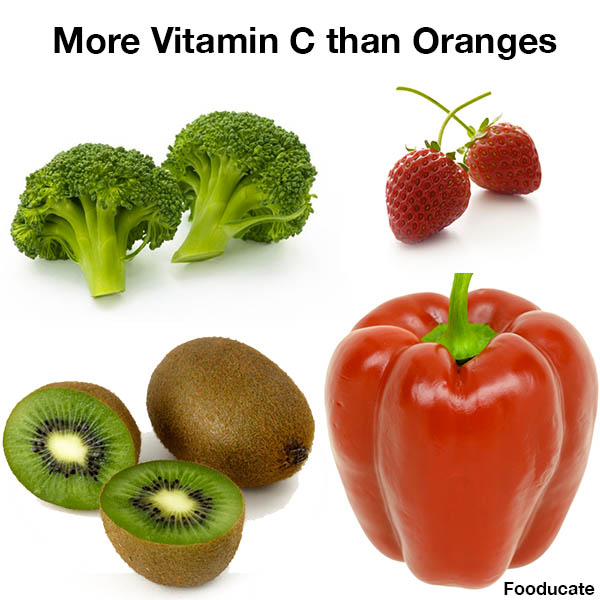
11. Vitamin D (Cholecalciferol/D3, Ergocalciferol/D2) – known as the “sunshine vitamin,” since it is made by the body after being in the sun. Ten to 15 minutes of sunshine three times a week is enough to produce the body’s requirement of vitamin D. Vitamin D helps the body absorb calcium, which is needed for the normal development and maintenance of healthy teeth and bones. It also helps maintain proper blood levels of calcium and phosphorus. Vitamin D aids in the intestinal absorption also of iron, magnesium, phosphate, and zinc. Found in mushrooms exposed to ultraviolet light, but main source comes from sun exposure. (Learn how to safely harness the healing rays of the sun HERE in Chapter 8.)
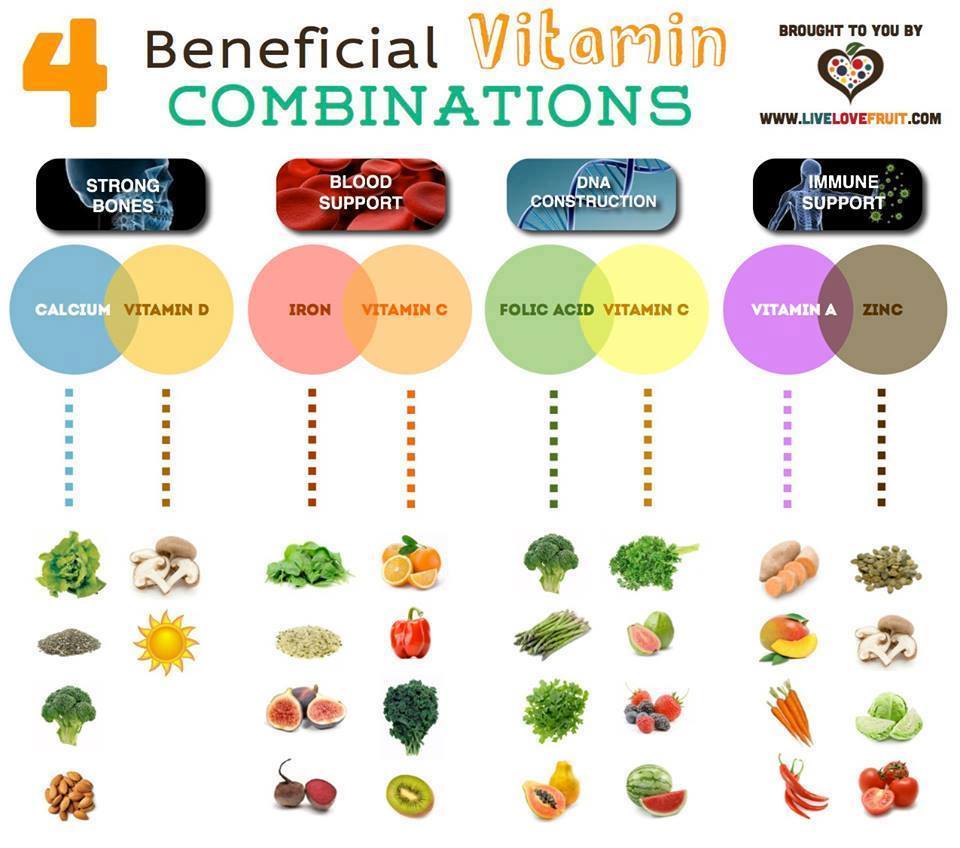
12. Vitamin E (Tocopherol) – an antioxidant that plays a role in the formation of red blood cells and helps the body use vitamin K. Found in avocados, dark green vegetables, papaya, mango, seeds, nuts, and wheat germ.
13. Vitamin K – without it blood would not stick together (coagulate). Some studies suggest that it is important for promoting bone health. Found in cabbage, cauliflower, whole grains, dark green vegetables, and dark leafy vegetables.
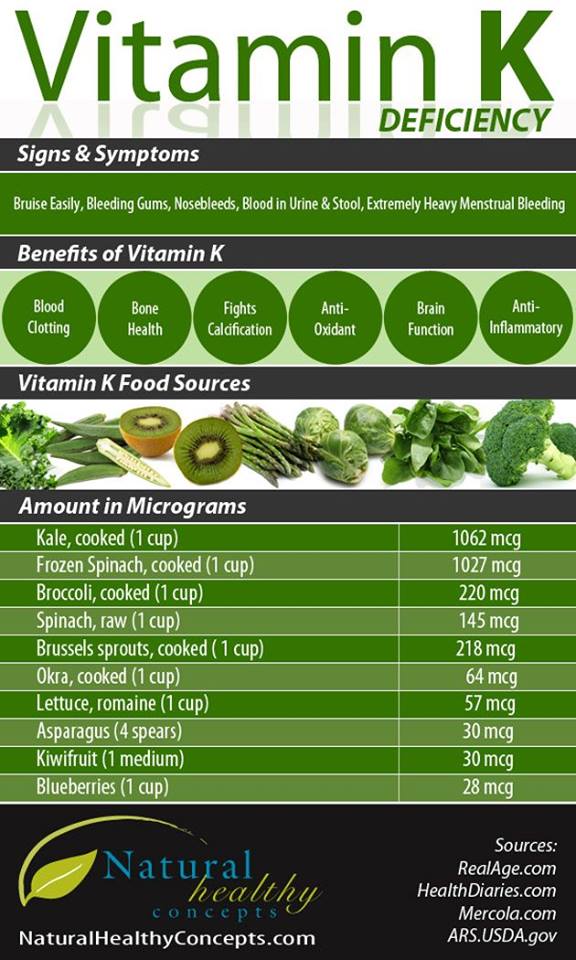
And a bonus:
Vitamin B17 (Nitrilosides, Amygdalin, Laetrile) – found in fruits, seeds, sprouts, nuts, spinach, beans, tubers, and grains. Isolated Amygdalin has been explored as a controversial alternative treatment for cancer.
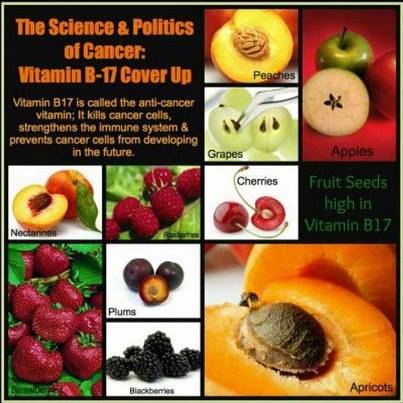
The best way to get all the daily vitamins you need is to eat a balanced diet that contains a wide variety of fruits, vegetables, legumes (dried beans), lentils, whole grains, nuts, seeds, tubers, a B12 supplement or fortified food, and safe sun exposure.
What is just as important as intaking adequate vitamin-rich foods is to stop eating, drinking, and doing things that waste vitamins once they are in your body. These substances and activities are: alcohol, caffeine (coffee, tea, chocolate, soda), sugar, tobacco, antibiotics, artificial food colorings, birth control pills, fever, radiation, stress, laxatives, microwave ovens, chlorine, overcooking, and large amounts of protein. It’s like working hard for money but maintaining a hole in your wallet.
Before taking a supplement for a known vitamin deficiency, stop wasting the vitamins you do have and improve your food selections. Temporary supplementation for acute vitamin deficiency may be necessary, however a regular use of isolated or multi-vitamins is never superior to improved diet and lifestyle.
Additional Resources:
• Choosing the Safest Fats, Carbs, and Proteins (about macro nutrients)
• Alkalizing the Body is Oxygenating the Body (about minerals)

{ 7 comments… read them below or add one }
Thanks, this is a great resource. Also, it is a good reminder that there are so many important vitamins, not only vitamin C 🙂
Geno Med recently posted..Dieta ciężarnych – jak uniknąć błędów żywieniowych?
What do you think about tocotrienols? I heard this new generation of vitamin e is 50 to 80 times stronger than tocopherol. Thanks.
jocelyn recently posted..Top 3 Reasons Why Some People Think That Kyani Products are a Scam
I don’t keep up with supplement news very much because I really don’t believe in the use of supplements except in the case of illness or injury.
The photographs really bring this post to life. The Vitamin A picture, especially, showcases scrumptious looking foods, which makes nutrition seem more pleasurable.
I love the info graphics here. Makes it really easy to remember which foods can give you those essential vitamins to feel much healthier! Thanks for sharing this information.
This is such a big bunch of information for vitamins we need..Everything we need in a balanced diet is mentioned in this post. Thanks Carla for letting us know what is essential for our body and the sources we get it from.. One can try to keep Yourself healthy by eating green leafy vegetables , fruits and other healthy food .
Finding the best food sources for all the vitamins our bodies need can be a challenging task, but this fantastic article has made it so much easier! It provides a comprehensive list of nutrient-rich foods that are packed with vitamins to support our overall health and well-being.
{ 4 trackbacks }